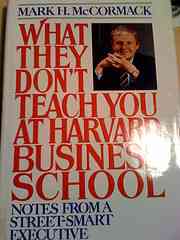Larry Chiang studies tendencies of business professionals like an Major League Baseball advance scout. Harvard Business School’s, Harbus, featured him in a cover story, “What They Don’t Teach You At Stanford Business School“. If you liked A Dozen B-School Students You Don’t Wanna Meet and The Art of Moderating a Panel in the Partial Attention Economy, you’ll love this post: “The Seven Mistakes of the B-Schooler Abroad”.
 No book signings: Just chapter release parties |
By Larry Chiang
A lot of my b-school buddies are overseas this summer. Maybe it’s the slow US job market or the allure of international business, but they are there in droves. Heck, I see more bay area people I know in Shanghai than at the Peet’s on University Avenue.
Anyway, here are seven mistakes to avoid.
-1- The Illlusion of Diversity at Home
Having an Indian or Chinese classmates does not increase the learning curve of doing busines abroad. They’re the whitest of their ethnicity because they went to college, high school and grade school here in the states. Most were probably in a sorority. Overseas Indian/Chinese will Shanghai you seven ways to Sunday if you’re not wary in business dealings.
Google “Mr China”… 17 deals before ONE honest deal. True story.
-2- We Are Not in Palo Alto Anymore.
Business at P.A.C.C., Palo Alto Community College, aka Stanford, is nuturing. Business plan competitions even have a 15th place winner*. As soon as your tourist Visa is stamped, expect all business assumptions to dissolve.
-3- Cultural Immersion vs. Advocacy
The countries that you are visiting have been doing business in a certain way for hundreds of centuries. In the year, 1500BC, they called it Year 1000. One country welcomes outsiders with a wall you can see from space. The biggest mistake an MBA can make is coming to China and trying to change 6000 years of inertia.
You can take the man out of China, but you can’t take the China outta the man. True story.
-4- Rockpiling with classmates.
Local contacts are invaluable. A rockpile keeps you from meeting locals because insulating yourself from with expat classmates keeps locals away. In Apocolapse Now, colonel Kurtz co-mingled with the locals to the nth degree. Don’t spend 100% of your time in a rockpile.
-5- The Art of Changing the Deal.
Deals overseas change all the time. Its how we sit for the screw before adapting to the screw. Read Mr. China.
17 deals went south before Mr China had one winner. Read the Art of Changing the Deal.
-6- Sex Management.
Girls overseas maybe easier or cheaper, but we aren’t minimizing our CPL (cost per lay)… we are maximizing value of time spent overseas. Remember to quote a dude with an IQ of 88, we can lose money chasing ass, but can’t lose ass building shareholder value.
-7- Stop Mingling in the Western Hotel
HBS doing a reunion at the Westin Shanghai on the Bund. How cliche. Remember, you can do as much “business” from the Palace Hotel in SF, so leverage your time overseas and get out of the five star surroundings.
Take note: My book’s business case study is getting turned into a movie (I hope). I am promoting the movie rights at the Sundance Film Festival where I am a hosting The AfterParty. Consider reading this your golden invite to my Sundance after party Jan 23, 2010.
If you liked this, you may also check:
 Larry’s mentor Mark McCormack wrote this in 1983. His own book comes out 09-09-09. It is called ‘What They Don’t Teach You At Stanford Business School‘. Larry’s book releases 09-09-09 |
This post was cranked out in about an hour so email me if you see a spelling or grammatical error(s)… larry@larrychiang com

Larry Chiang started his first company, United College Marketing Services, in college. He mimicked his mentor, Mark McCormack, founder of IMG who wrote the book, “What They Don’t Teach You at Harvard Business School”.
Text or call him during office hours 11:11am or 11:11pm PST +/-11 minutes at 650-283-8008. If you email him, be sure to include your cell number in the subject line.


 Larry speaks on stuff they don't teach in B-school to help you get street smart in doing business. In college, he started a business that helps college students with their FICO score. He loves entrepreneurs, Ben and Jerry's ice cream and after parties. You can reach him at:
Larry speaks on stuff they don't teach in B-school to help you get street smart in doing business. In college, he started a business that helps college students with their FICO score. He loves entrepreneurs, Ben and Jerry's ice cream and after parties. You can reach him at:




